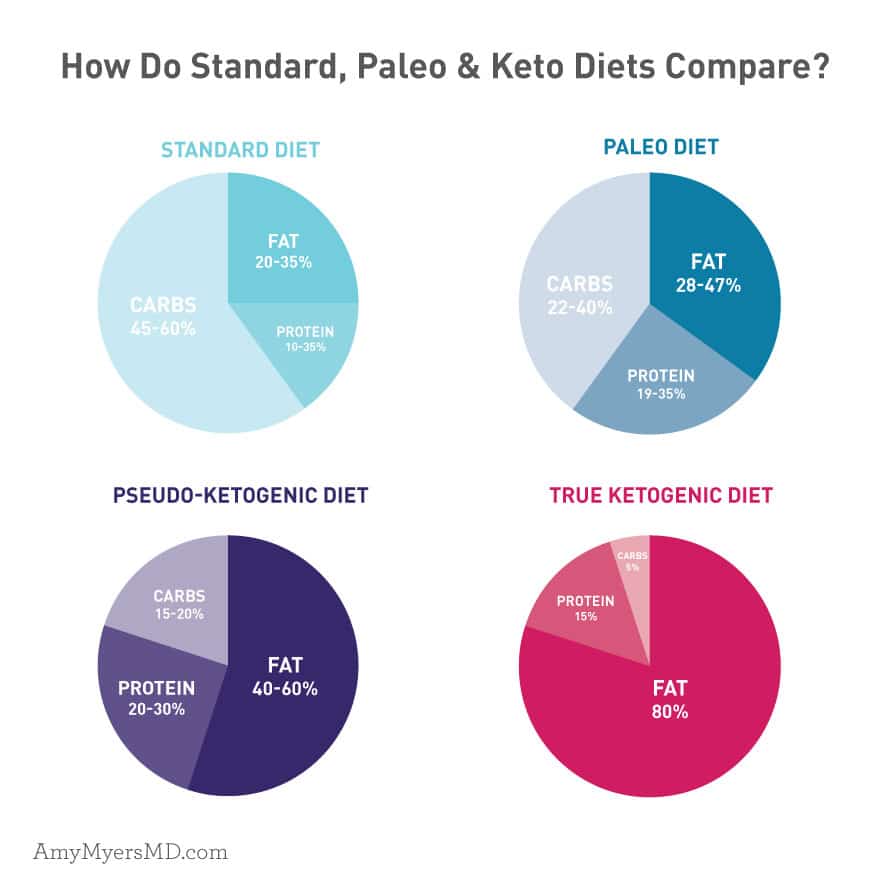Ketogenic (or “keto”) diets have become tremendously popular in the past few years, leading many members of our community to ask, “Should you try a keto diet if you have an autoimmune disease?”
In this article, I’ll cover everything you need to know about the ketogenic diet. I’ll also discuss important points to keep in mind if you have an autoimmune disease and want to try keto, including how to support your liver and optimally metabolize fat!
[lwptoc]
What is a Keto Diet?
The ketogenic diet is a low-carb, high-fat diet. It triggers the body’s natural metabolic process known as “ketosis.” Consuming minimal amounts of carbohydrates deprives your body of its natural fuel source, glucose, forcing it to use stored fat as fuel instead.1 As stored fat is broken down, your liver produces “ketones,” a type of fatty acid, and sends them into your bloodstream where your muscles and other tissues use them as fuel.2 Ketosis normally occurs in a fasting state, however it can also occur in the absence of glucose and in the presence of medium-chain triglycerides (MCTs), such as those found in coconut.3
 Dr. Amy Myers
March 10th, 2018
https://content.amymyersmd.com/article/keto-diet-autoimmune-disease/How Do Standard, Paleo, and Keto Diets Compare? – Infographic – Amy Myers MD®
Dr. Amy Myers
March 10th, 2018
https://content.amymyersmd.com/article/keto-diet-autoimmune-disease/How Do Standard, Paleo, and Keto Diets Compare? – Infographic – Amy Myers MD®As you can see, keto diets contain far fewer carbs and more than double the amount of fats typically consumed in standard diets or even Paleo diets. You also want to make sure you are consuming only moderate amounts of protein—on the low end of what you’d normally eat on standard and Paleo diets—because too much protein can kick you out of ketosis.
History of the Keto Diet
I want to point out that although keto diets have seen a recent resurgence, they are not “new” in any sense of the word. The ketogenic diet was developed during the 1920s as an alternative therapy for children with epilepsy, while fasting was used as a way to treat disease for thousands of years.
4Now people use the keto diet primarily to lose weight, increase energy, and optimize brain function. However, given its success in reducing the number of seizures in epileptic patients, more research has emerged exploring the ability of the ketogenic diet to treat a range of neurologic disorders and other types of chronic illnesses.
Health Benefits of a Keto Diet
With the development of prescription medications for seizures, the ketogenic diet fell off the radar. Now that it is regaining traction in mainstream society, researchers are beginning to look more closely at the keto diet for its ability to mitigate the symptoms of a number of disorders, including neurodegenerative diseases, obesity, diabetes, cancer, and even some autoimmune conditions.
Neurodegenerative Disease
There is already solid evidence that the ketogenic diet reduces seizures in children, sometimes as effectively as medication.
5It has been found to be especially effective when patients do not respond well to drug treatments.
6New research indicates the benefits of keto extend to a broad range of neurodegenerative disorders. This includes Alzheimer’s, Parkinson’s, and multiple sclerosis (MS). It may also be protective in traumatic brain injury and stroke.
7One theory for keto’s neuroprotective effects is that the ketones produced during ketosis provide additional fuel to brain cells, which may help those cells resist damage from inflammation caused by these diseases.
8Additionally, animal studies showed the ketogenic diet’s ability to reduce oxidative stress and inflammation. It also increased ATP production, and improved learning, memory, and motor ability.
9,
10ATP production is critical for neural development, signaling, and controlling the immune system.
Obesity and Type 2 Diabetes
Your body burns stored fat when in ketosis so the keto diet can be an effective tool for weight loss. A study on the long-term effects of ketogenic diets in obese patients found that it significantly reduced body weight and body mass index. It also decreased levels of triglycerides, LDL cholesterol and blood glucose, and increased the level of HDL cholesterol.
11In addition to promoting weight loss and its associated benefits, low-carb diets also improve insulin sensitivity. For anyone with type 2 diabetes, the keto diet may be an ideal option. According to a study conducted by the University of Michigan, eating three low-carb meals within 24 hours reduced insulin resistance by more than 30%.
12Cancer
Ketogenic diets may be one of the few treatments that show promise for cancer. Cancer cells feed off of glucose. When you deprive your body of glucose by adopting a very low- to no-carb diet, you are “starving” the cancer cells.
13As early as 1987, studies on ketogenic diets resulted in reduced tumor growth and improved survival. Ketosis by fasting also showed to help alleviate side effects of chemotherapy, and improve the effectiveness of radiation. Advanced cancer patients may also benefit from a keto diet in terms of quality of life. They may experience improved moods and reduced insomnia.
14Autoimmune Disease
The keto diet reduces inflammation and modulates the immune response. It could be an effective tool for reversing symptoms of autoimmunity. Ketogenic diets also increase glutathione levels, which is your body’s most powerful detoxifier.
15People with autoimmunity are notoriously low in glutathione, and I’ve found in both my patients and myself that supplementing with glutathione is extremely beneficial.
The Keto Diet and Autoimmunity
If you have any of the above conditions, by all means, give keto a try! If you have an autoimmune disease and are following The Myers Way®, you know the most important part is cutting out the toxic and inflammatory foods that lead to autoimmunity. You can definitely do a ketogenic version of that! The Myers Way® already eliminates gluten, grains, and legumes. It is very low-carb to begin with, especially if you are following the Candida Breakthrough® or SIBO protocols. This will give you a head start when transitioning to a keto diet. However, there are a few important factors to consider before trying keto if you have an autoimmune disease.
Hormones, Thyroid Function, and Ketosis
Though I am not opposed to a keto diet, I personally did not do well on it. I’ve found that for many of my patients with autoimmunity, it is not always the right choice. This is particularly true of women and those with thyroid dysfunction. Many women, especially those going through perimenopause, find the keto diet difficult. Their hormones are fluctuating so much that they need carbohydrates to support and balance them. Ketosis can also strain your adrenals. As their adrenals are already shot, perimenopausal women and those with thyroid dysfunction can experience issues with keto. The same goes if you are overly stressed. Chronic stress puts your adrenals into overdrive for extended periods of time leaving you in a state of adrenal fatigue. You would want to address your stress levels before attempting a keto diet in order to prevent total adrenal burnout.
If you don’t respond well to keto, don’t beat yourself up! It may be all the rage right now and maybe your husband lost 20 pounds by going keto. That does not mean it will work for you. I do find that men tend to tolerate the keto diet much better than women. Everyone and their body are unique. It comes down to listening to your body and knowing what’s right for you.
Top Supplements to Support Yourself on a Keto Diet
If you have autoimmunity and are interested in pursuing a ketogenic diet, there are a few ways you can support your transition.
Paleo Protein and Collagen
When transitioning to a keto diet I recommend adding Paleo Protein and Collagen to your diet. Paleo Protein is a low-carb, clean source of hydrolyzed bovine collagen protein that you can blend right into a smoothie. Collagen is a zero-carb source of protein that you can stir into any beverage or bowl. It’s perfect for smoothies, juices, acai bowls, and desserts!
Adrenal Support
Women and anyone with thyroid dysfunction or chronic stress can benefit from supplementing with Adrenal Support when following a keto diet. Adrenal Support promotes optimal stress response, adrenal health, and stress hormone production.
Multivitamin
Keeping an eye on your thyroid hormone levels is especially critical when transitioning to a keto diet. Balance and optimize your levels with a multivitamin to ensure you are getting enough selenium, iodine, and zinc. All of these nutrients are necessary to support optimal thyroid function.
Enzymes
If your body is not used to consuming a high-fat diet, it could take time for your digestion to adjust. Digestive enzymes will help your body break down fat to ease you into the transition.
Liver Support
Keto can be hard on the liver because it is primarily the liver that metabolizes fat for energy. For that reason, I recommend anyone following a keto diet to take Liver Support in order to optimize liver function.
This may be just the beginning of your keto diet journey. If that’s the case, I want to provide you with information to make the most of it! You can use this resource as a guide for how to follow The Myers Way® while transitioning to a keto diet.
Article Sources
- https://www.medicalnewstoday.com/articles/180858.php.
- https://www.webmd.com/diabetes/qa/what-are-ketones.
- Martin, Colin R., Victor R. Preedy, and Angela M. Abbatecola. Diet and Nutrition in Dementia and Cognitive Decline. London, England: Academic Press, 2015. Print.
- https://www.news-medical.net/health/History-of-the-Ketogenic-Diet.aspx.
- https://www.health.harvard.edu/blog/ketogenic-diet-is-the-ultimate-low-carb-diet-good-for-you-2017072712089.
- https://www.healthline.com/health-news/keto-diet-is-gaining-popularity-but-is-it-safe-121914#2.
- https://www.ncbi.nlm.nih.gov/pmc/articles/PMC2367001/.
- https://www.healthline.com/health/multiple-sclerosis/ketogenic-diet#ketosis.
- https://www.ncbi.nlm.nih.gov/pmc/articles/PMC4709725/.
- https://www.news-medical.net/life-sciences/Adenosine-Triphosphate-(ATP)-Function-in-Cells.aspx.
- https://www.ncbi.nlm.nih.gov/pmc/articles/PMC2716748/.
- //ns.umich.edu/new/releases/24325-u-m-study-bodes-well-for-low-carb-eaters.
- https://www.ncbi.nlm.nih.gov/pmc/articles/PMC3157418/.
- https://www.ncbi.nlm.nih.gov/pmc/articles/PMC4215472/.
- https://www.ncbi.nlm.nih.gov/pmc/articles/PMC4709725/.
